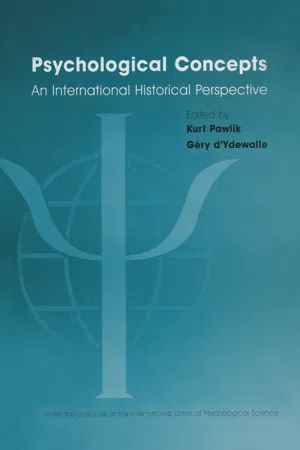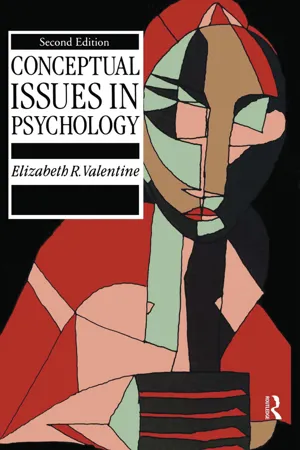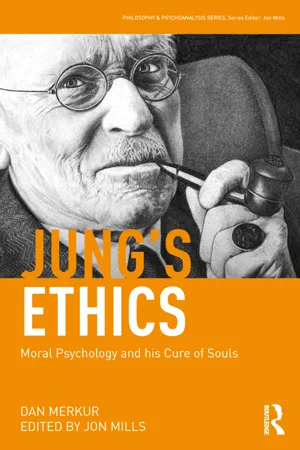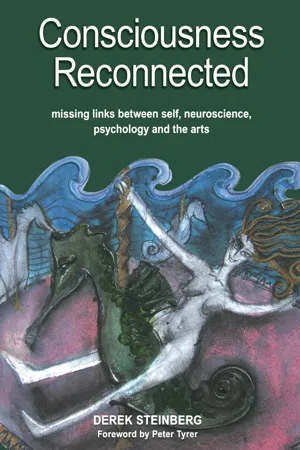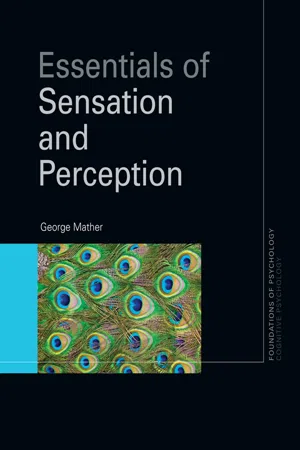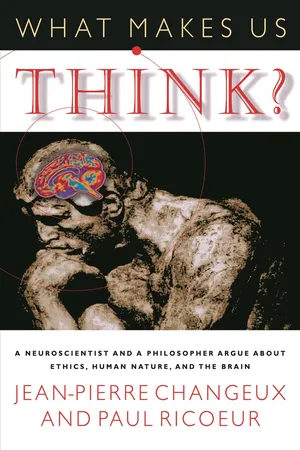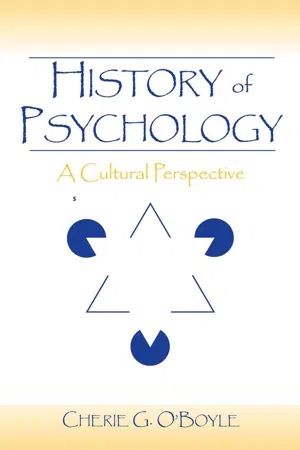Defining consciousness
Defining consciousness refers to the attempt to understand and explain the state of being aware of and able to perceive one's surroundings and experiences. It involves exploring the nature of subjective experiences, self-awareness, and the ability to process information. This concept is central to the study of human cognition and behavior.
8 Key excerpts on "Defining consciousness"
- eBook - ePub
Psychological Concepts
An International Historical Perspective
- Kurt Pawlik, Gery d'Ydewalle(Authors)
- 2020(Publication Date)
- Psychology Press(Publisher)
...3 Consciousness: Psychological, neuroscientific, and cultural perspectives Volker Gadenne From a historical viewpoint, consciousness is one of the most remarkable phenomena. Some time ago, it was regarded as the genuine subject of psychology. Then, in the first half of the twentieth century, mainstream psychology rejected consciousness as an object of science. Although not many behaviorists held the radical view that there were no mental states, most of them accepted the methodological position that the mental could not be studied scientifically and was useless for the explanation of behavior. In the course of the cognitive revolution, consciousness was reintroduced, and became a major subject of several disciplines. Now thousands of psychologists, neurobiologists, cognitive scientists, linguists, and philosophers address to that subject (cf. Baars, 2003). New journals were founded and many interdisciplinary conferences were organized. Yet some psychologists have remained suspicious of this development and still hold that consciousness should be left to philosophy, theology, and art. But they seem to be in the minority. Concepts of consciousness The word “consciousness” has its origin in the Greek syneidesis (as used, e.g. by Heraclitus) and the Latin conscientia (cf. Jung, 1933). Suppose that a person A knows something, perhaps some fact not accessible to everybody. However, a second person, B, knows that fact, too. In this case, B has syneidesis (used, for example, by Sophocles in his Antigone), or conscientia. Now, assume that B is not another person, but an instance in A’s mind that knows about A’s actions, and judges them as moral or unmoral. Here conscientia means what we now call “conscience”. There is still another meaning of syneidesis/conscientia: Leave out the moral aspect and conceive of B as an inner state or instance that perceives, or reflects on, what happens in A’s mind...
- eBook - ePub
- Elizabeth R. Valentine(Author)
- 2013(Publication Date)
- Routledge(Publisher)
...293). Consciousness is peculiar in that one has special access to one’s own, but this does not detract in any way from the possibility of studying it scientifically. Conscious processes of others, unconscious mental processes and the external world all have the same epistemological status; namely, that of inferred constructs. Conscious experience provides data of the observer’s own consciousness immediately and directly, and of that of others mediately and indirectly through the observation of their behaviour, both in the form of what might be called ‘performance responses’ as well as by means of verbal reports, and of their neurophysiology. These observations are themselves part of consciousness. Thus consciousness provides data for all sciences but its status as subject matter in psychological science is that of an inferred construct. So far as psychology is interested in the processes underlying behaviour, this is true of all its subject matter. The use of introspective reports is discussed in Chapter 5. The Nature of Consciousness What is Consciousness? Consciousness has the paradoxical quality of being intuitively obvious, everyone having immediate knowledge of it, yet extremely difficult to define. Miller (1964) has drawn attention to the range of meanings it has had for different people: ‘a state of being, a substance, a process, a place, an epi-phenomenon, an emergent aspect of matter, or the only true reality’. The most basic sense of consciousness is in terms of experience or awareness. Many have emphasised this phenomenal aspect, for example Titchener (1899), for whom consciousness was ‘the sum total of a person’s experiences as they are at any given time’. An important distinction is that between consciousness in the sense of sensory experience – which Jackendoff (1987) terms ‘primary awareness’ – and a higher order self-consciousness in which one is aware of being aware (‘reflective consciousness’)...
- eBook - ePub
Everyday Music Listening
Absorption, Dissociation and Trancing
- Ruth Herbert(Author)
- 2016(Publication Date)
- Routledge(Publisher)
...William James’s two-volume ‘Principles of Psychology’ (1890) provided a detailed consideration of consciousness and its relation to mental processes, while the Phenomenological tradition was established at the beginning of the twentieth century by Husserl (1913). 2 In the same year, in a classic paper entitled Psychology as the Behaviourist Views It, J.B. Watson established behaviourism, suggesting that ‘by making consciousness the primary subject matter of psychology, behavioural data were reduced to having no value’ (Pekala, 1991: 21). Behaviourism offered a practical and functional approach to psychologists – the study of observable, external behaviour – that was quickly adopted. Braisby notes that, for some decades afterwards, ‘belief in a consciousness that could not be objectively observed or measured was [consequently] seen as speculative at best, and a rejection of the scientific approach to psychology at worst’ (2002: 188). Consciousness continued to be ignored for some time by the developing tradition (from the 1950s) of cognitive psychology, which tended to focus on mental components such as memory and attention. Since the 1980s and 1990s, however, the study of consciousness has ‘assumed a much greater urgency’ (2002: 188) and is now a multidisciplinary field drawing contributions from neuropsychology, neuroscience, philosophy and cognitive psychology. Kinds of Consciousness There is no ‘generally agreed definition’ of consciousness (Blackmore, 2005: 7), but the term is commonly equated with the word ‘awareness’ and used to describe subjective or phenomenal experience. In an overview of the field, Braisby observes that ‘it is not yet clear that we have conceptualized consciousness appropriately’ (2002: 197)...
- eBook - ePub
Jung's Ethics
Moral Psychology and his Cure of Souls
- Dan Merkur, Jon Mills, Jon Mills(Authors)
- 2017(Publication Date)
- Routledge(Publisher)
...Chapter 6 Consciousness and its expansion Consciousness was the only reality that Jung considered empirical. “The only things we experience immediately are the contents of consciousness” (Jung, 1948i, pp. 139–40). “Consciousness is: this time, this here and now. Consciousness wants to let everything appear as a here and now” (Jung, 2008, p. 80). Jung’s references to consciousness differed from those of Freud, who confusingly used the same term consciousness in reference both to a quality that different mental contents possess at some times, and also to a subdivision of the psyche having a great many functions, not all of which are qualitatively conscious at any single moment. Jung regularly employed the term in its qualitative sense alone. The conscious mind … is characterized by a certain narrowness. It can hold only a few simultaneous contents at a given moment. All the rest is unconscious at the time, and we only get a sort of continuation or a general understanding or awareness of a conscious world through the succession of conscious moments.… The area of the unconscious is enormous and always continuous, while the area of consciousness is a restricted field of momentary vision. (Jung, 1936a, p. 9) Noting that consciousness never exists apart from the ego, Jung suggested that consciousness is a quality that psychic materials acquire when they are associated with the ego. “Anything psychic will take on the quality of consciousness if it comes into association with the ego” (Jung, 1926b, p. 323; see also 1936a, p. 11; 1939a, p. 275; 1954d, p. 484; 1970, p. 107; 1973a, pp. 254–5, 262; 1997, p. 154). Jung characterized the ego in terms of functions that Freud (1900) credited to the system Perception-Consciousness (Pcpt.-Cs.). The ego is a complex datum which is constituted first of all by a general awareness of your body, of your existence, and secondly by your memory data; you have a certain idea of having been, a long series of memories. (Jung, 1936a, p...
- eBook - ePub
Consciousness Reconnected
Missing Links Between Self, Neuroscience, Psychology and the Arts
- Derek Steinberg(Author)
- 2018(Publication Date)
- CRC Press(Publisher)
...2 Consciousness disconnected The title, some definitions, and ways of thinking about consciousness I cannot totally grasp all that I am. Thus the mind is not large enough to contain itself: but how can there be any part of itself that is not in itself? (St Augustine ad 354–430, Confessions 1961) Consciousness and the sense of self Again, there has been not one Big Bang, but three, and of these the most extraordinary by far is the emergence of Consciousness. Consciousness, that is, in the human sense, awareness not only of a range of stimuli, sensations and perceptions such as animals show, but a subjective sense of personal identity, of the self, at the centre of individual existence. This is what this book is about. Later, when we review what others have made of the subject, we will see that the issue of the core self has often been evaded one way or another, sometimes left out of the argument, and sometimes described as the ultimate mystery, possibly one beyond all objective explanation. I have a certain regard for this latter conclusion because for all that it is ultimately unsatisfactory, it does indicate the size of the question. One of the aims of this book is to try to find ways of conceptualising consciousness and our sense of self, albeit that it is near-indescribable, because we are attempting to grasp the nature of our self-consciousness with our self-consciousness, something akin to lifting ourselves off the ground by our bootstraps. Within an infinity of cosmic time and dark, insensate space, each individual’s sense of personal identity flares into infinitesimally brief moments of existence and then fade again – like a shooting star – as far as we know forever; yet in that split nanomoment of cosmic time with nothingness on either side, each human being becomes so much individually, in terms of memories, anticipations and relationships, and within their role, small or large, contributing to whole cultures and civilisations...
- eBook - ePub
- George Mather(Author)
- 2014(Publication Date)
- Routledge(Publisher)
...Consciousness and perception 9 What this chapter will teach you What is the difference between Cartesian dualism and identity theory? What techniques can be used to study the neural correlates of consciousness? What role might the thalamus play in consciousness? How does identity theory relate to epiphenomenalism in consciousness? Introduction Everyone feels that they know what consciousness is from first-hand experience: awareness of oneself and one’s surroundings. Perceptual awareness of the world is undoubtedly one of the defining features of consciousness, so a book such as this on fundamental concepts in sensation and perception would be incomplete without a discussion of consciousness. Consciousness is a fascinating but elusive and baffling phenomenon to study scientifically. Perceptual scientists largely ignore consciousness, taking it as given, because it is usually not relevant to the theories of sensory processing that they develop and test. Consciousness is the ‘elephant in the room’, a massive unresolved issue. Indeed some philosophers argue that the human mind can never get to the bottom of consciousness. According to this view, all minds have a limit as to what they can represent, a representational capacity. What is closed to a fly’s mind may be open to a monkey’s mind (if either of those creatures can be considered to have a mind). A monkey can use a stick to reach food that is just out of reach, but often a fly cannot even escape from a room by finding an open window. Perhaps human minds do not possess the representational capacity to grasp the true nature of consciousness (McGinn, 1993)? If this is the case then there is no alternative but to wait until humans evolve better brains, or until a sufficiently powerful non-human brain comes along. This view seems overly pessimistic, an excuse for doing nothing...
- eBook - ePub
What Makes Us Think?
A Neuroscientist and a Philosopher Argue about Ethics, Human Nature, and the Brain
- Jean-Pierre Changeux, Paul Ricoeur, M. B. DeBevoise(Authors)
- 2021(Publication Date)
- Princeton University Press(Publisher)
...4 - Consciousness of Oneself and of Others Conscious Space Jean-Pierre Changeux: The activity of communicating, of making oneself understood, occurs among alert and conscious subjects. The problems associated with consciousness need to be approached with care. I will try first to define the notion of conscious space. This may be thought of as a sort of milieu intérieur —a neural setting within the brain, still very poorly described by the neurosciences, for operations that are qualitatively distinct from those carried out in the other unconscious parts of our brain and our nervous system. This space is given over to simulation, to virtual action. Its development from lower vertebrates to humans is dazzling. Although it is internal to the organism, it is somehow inserted between the external world and the organism. At this level one finds intentions, goals, plans, courses of action evaluated with constant reference to (at least) four poles involving distinct systems of neurons: actual interaction with the external world—this opening onto the world that you yourself have mentioned; the self and the whole of an individual’s history, which takes the form of remembered events, of a narrative reconstituted from one’s own life and the memory of prior experiences marked somatically by their emotional tone; and, finally, internalized rules and social conventions, as well as those global conceptions of man and society that each person tacitly carries within himself or herself. Here I recall your definition of narration—a concrete example if ever there was one of the operations carried out in the conscious space of the brain—as “deploying an imaginary space for thought experiments in which moral judgment operates in a hypothetical mode.” 1 This suits me perfectly...
- eBook - ePub
History of Psychology
A Cultural Perspective
- Cherie G. O'Boyle(Author)
- 2014(Publication Date)
- Psychology Press(Publisher)
...For example, it is possible to respond to hearing one's own name spoken while still asleep. Dreams can often only be called into conscious awareness with difficulty later. Under hypnosis, memories can be retrieved that are not available to consciousness. In experimental studies, people are influenced by stimuli, even though the exposure is so brief that they insist they have no memory of them (Marcel, 1983). To the 19th-century scholar, these kinds of experiences suggest the existence of two minds, one conscious and one unconscious. Even Fechner's psychophysics suggest the existence of unconscious mental processing. If mind is soul, and there is more than one mind, which of these minds is soul? Is soul the conscious and rational mind or the largely unconscious mind? Is the unconscious mind also rational, or do the roots of irrational thoughts and behaviors lie somewhere in its dark mysteries? Questions like these haunt physicians and psychologists of the late 19th century, like Sigmund Freud. Along with the loosening of religious grip on intellectual concerns, these questions may help account for the declining focus toward the end of the century on psychology as the study of the human soul. Like a prism with many sides, psychology is a discipline with many facets as it moves into the next century. The Times The early 19th century sees the Industrial Revolution beginning with the machine production of textiles followed by the mass production of a wide variety of consumer goods. Machine industry provides jobs and creates a middle class, which provides the market for these goods. By mid-century, there have been many improvements in the daily lives of ordinary people. For almost the first time in human history, many people can afford more than one set of clothes...
